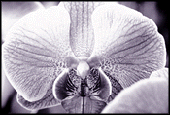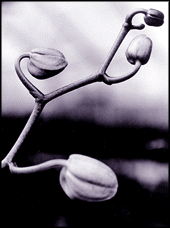March 9 - 16, 2000
![[Features]](/standard/image/headers/urban_buy_header.gif)
The power flower
Orchids get their moment in the sun
by Leslie Robarge
This is clearly the year of the orchid.
From Susan Orlean's best-selling book The Orchid Thief (now out in paperback from Ballantine; $14) to the Harvard Museum of Natural History's exhibition "Orchids: A Story of Seduction" (on through May 14), the flower that has inspired centuries of greenhouse obsession is suddenly blossoming in popularity.
People who collect orchids describe them with anthropomorphic adjectives: they're elegant, mysterious, seductive. They've inspired thievery, caused addiction. All this for a simple and delicate flower that blooms once, maybe twice a year.
It used to be that obtaining an orchid required a trip to South America -- or as many as five years of waiting as a plant grew from seed. Today, cloning has greatly increased the quantity and availability of adult orchid plants. Most flower nurseries sell orchids, and the most common type, the phalaenopsis, is even available at Stop & Shop. The price for a plant usually ranges from $15 to $80, depending on the rarity and quality of the flower.
For all their popularity, orchids still have a reputation of being impossible to keep alive. "It's a myth that they're difficult to take care of," says Linda Abrams, a member of the Massachusetts Orchid Society. The most common mistake, according to Abrams, is overwatering: because orchids are tropical, people think the plants need to be wet all the time. What's really important is to keep the cedar chips they're planted in well aerated. Orchids also need a good amount of indirect sunlight, and adequate drainage. A healthy plant can survive for almost 20 years.
If you ask Victor DeRosa, owner of DeRosa's Orchids, in Natick, the mass embrace of the orchid is long overdue. He understands what's at the root of its enduring cult: "It's like if you started taking drugs," he says. "You just fall in love with them. They're different from any other flower."



